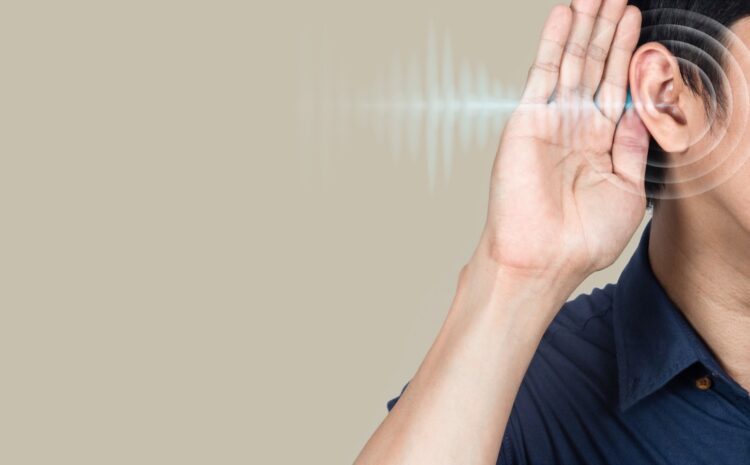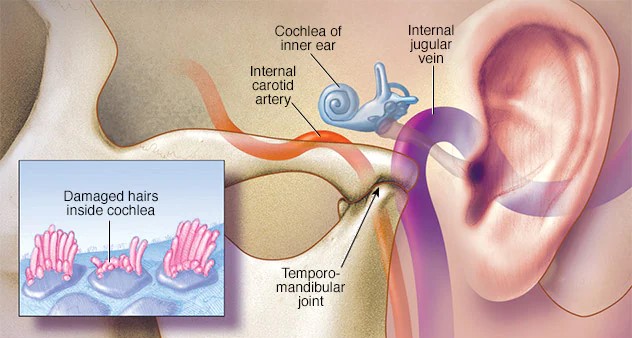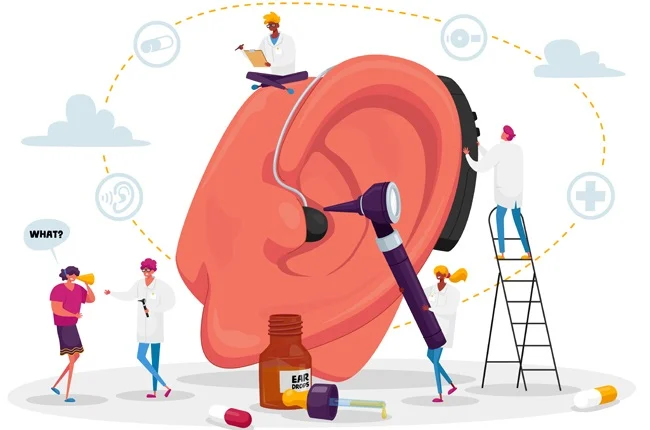
Tinnitus: Breaking the Sound Barrier
Tinnitus is a disorder characterised by the very feel or impression of sound heard even when there is no external sound source present. Tinnitus patients perceive noises in their ears or heads that might be described as ringing, buzzing, hissing, whistling, or humming. These noises may be continuous or sporadic, and their strength can change.
It is not a disease itself but rather a symptom of an
underlying condition. It can be caused by various factors:
1. Age-related hearing loss causing gradual hearing loss is a common cause of tinnitus. Continuous exposure to hard sounds can induce this, like loud music, machinery, or explosion etc. They can damage the intricate parts of the inner ear and end up in tinnitus. A build-up of earwax in ears can cause tinnitus by blocking the ear canal and interfering with sound transmission.
2. Ear and sinus infections or sinuses can cause temporary tinnitus. Meniere’s disease is an inner ear disorder which causes episodes of tinnitus along with vertigo (dizziness) and hearing loss. Medications such as high doses of aspirin, some antibiotics, and diuretics, can cause tinnitus as a side effect. Traumatic brain injury or concussions can sometimes result in tinnitus. Medical conditions like high blood pressure, thyroid problems, jaw joint and vascular disorders can lead to tinnitus. Tinnitus can have varying effects on individuals, ranging from mild annoyance to significant disruption of daily life, concentration and sleep.
3. Humming in ears or pulsatile tinnitus: Experiencing a humming sound in the ears, also known as pulsatile tinnitus, is a specific type of tinnitus where the perceived sound has a rhythmic or pulsating quality, often synchronized with the person’s heartbeat. This sensation is different from the constant or intermittent ringing or buzzing associated with typical tinnitus.
4. Pulsatile tinnitus is often caused by the perception of blood flow or muscular contractions near the ear. Vascular conditions such as high blood pressure, atherosclerosis, or abnormal blood flow in the head and neck can result in pulsatile tinnitus. Similarly, Vascular glomus tumours benign tumours like or arteriovenous malformations can cause pulsatile tinnitus by affecting blood flow near the ear. Sometimes, eustachian tube dysfunction which helps equalize pressure in the middle ear, can lead to pulsatile tinnitus. Involuntary contractions of muscles in the ear or surrounding areas can produce a pulsatile sound. Likewise, certain medications, such as certain antibiotics, diuretics, or aspirin, can cause pulsatile tinnitus as a side effect.

5. Tinnitus causes: Tinnitus can have various causes, and it is often associated with damage or dysfunction in the auditory system.
As discussed earlier, it can be due to age- related hearing loss, noise-induced hearing loss, earwax blockage of ear canal, ototoxic medications like high doses of aspirin, nonsteroidal anti-inflammatory drugs (NSAIDs), some antibiotics (e.g., gentamicin, erythromycin), diuretics, and certain cancer medications etc.
Besides, sinus infections, Ménière’s disease, temporomandibular joint (TMJ) disorders, head and neck injurie, high blood pressure, disorders, diabetes, vascular thyroid disorders, autoimmune diseases, certain neurological disorders, all can cause this ailment.
6. Tinnitus treatment: The treatment of tinnitus depends on the underlying cause and the impact it has on an individual’s quality of life. While there is currently no known cure for tinnitus, there are strategies and various management treatments that can help alleviate its effects.
If tinnitus is due to any other ailment of the person, treating that condition may help reduce or eliminate tinnitus symptoms. This can involve managing high blood pressure, addressing thyroid problems, or treating ear infections, among other interventions.
Sound therapy aims to provide external sounds that can help distract from or mask the perception of tinnitus. This can include using devices such as white noise machines, fans, or specially designed tinnitus maskers that produce soothing sounds.
7. Cognitive Behavioural Therapy (CBT) can help individuals change their thoughts, emotions, and behaviours related to tinnitus. This therapy aims to reduce the distress and negative impact of tinnitus on daily life by helping individuals develop coping strategies and promoting relaxation techniques.
Tinnitus Retraining Therapy (TRT) combines sound therapy with counselling to help individuals habituate to the perception of tinnitus. It involves the use of low-level, individually tailored sound generators to provide background noise and counselling to change negative emotional responses to tinnitus.
8. Medications are prescribed to manage associated symptoms such as anxiety, depression, or sleep disturbances. Medications may be used on a case-by-case basis and should be prescribed monitored by a healthcare professional.
Stress management and lifestyle changes can help to face stress, relaxation exercises, and getting sufficient sleep can be helpful. Avoiding exposure to loud noises, wearing ear protection in noisy environments, and reducing caffeine and alcohol consumption may also alleviate symptoms.

9. Tinnitus icd10: International Classification of Diseases, 10th Revision (ICD-10), defines tinnitus and classified under the “H93.1” code. The complete ICD-10 code for tinnitus is H93.1X, where “X” represents the specific location or laterality of the tinnitus. Here are some examples of specific codes for tinnitus:
H93.1X1: Tinnitus, right ear
H93.1X2: Tinnitus, left ear.
H93.1X3: Tinnitus, bilateral (both ears)
H93.1X9: Tinnitus, unspecified ear.
10. The American Speech-Language-Hearing Association (ASHA) put together this list of 2023 International Classification of Diseases, Tenth Revision, Clinical Modification (ICD-10- CM) codes for audiologists to use when describing hearing and vestibular disorders. The ICD-10-CM year 2023 will start on October 1, 2022.
It’s important to note that the specific code used may depend on the clinical documentation, severity, and any associated conditions. The ICD-10 code for tinnitus provides a standardized way to classify and record the condition for medical and billing purposes.
11. Noise in ears not tinnitus: If you are experiencing a noise in your ears that is not associated with tinnitus, it’s possible that you may be referring to a different phenomenon. There can be various reasons for perceiving noises in the ears that are distinct from tinnitus. Here are a few possibilities:
Excessive earwax buildup, Eustachian tube dysfunction, fluid accumulation in the middle ear, Temporomandibular joint (TMJ) disorder, Palatal myoclonus, etc are known to cause tinnitus.



